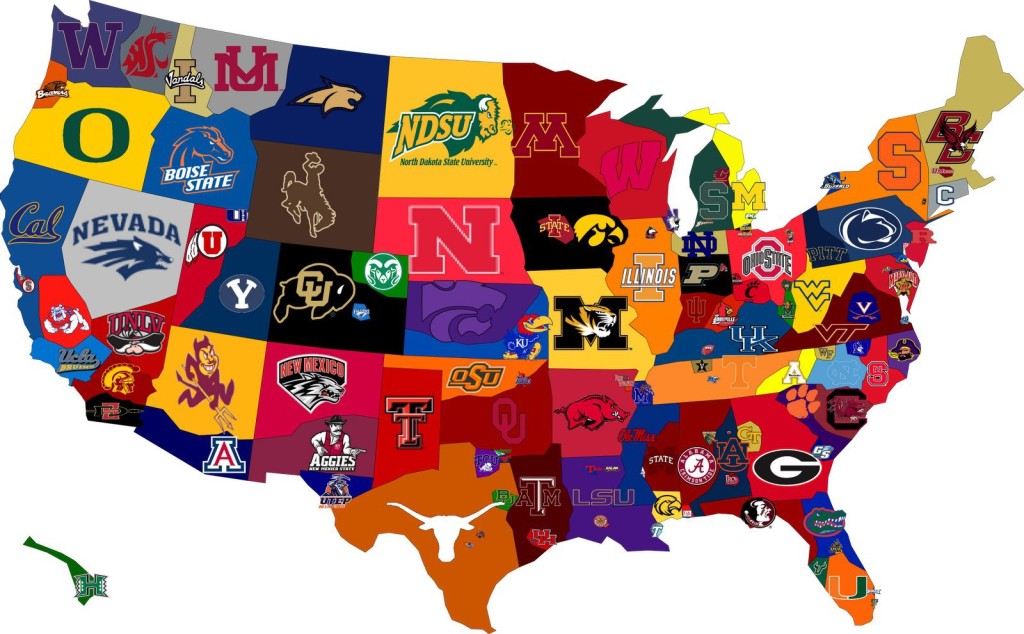Of course, this simple question does not have a simple answer. But for the final post of this series, I wanted to summarize some of the main points of view to try and reach somewhat of a consensus and better define this civic issue.
The response to this question will vary greatly depending on who you ask. College athletes might have a very different perspective than regular students, and faculty or parents might provide additional viewpoints. But let’s start with looking at universities in general. What do the presidents and leaders of these institutions have to say about sports on their campuses?
The response is pretty uniform for most division one schools: college sports are great. Why? Well because they bring tons of publicity to the school, and with publicity comes money. And lots of it: in 2010, the collective revenue of the 15 highest-grossing college football programs in the United States was more than $1 billion. So in the eyes of big D1 schools, more publicity (from televised games or famous players) means more interested students, which means more parents shelling out hundreds of dollars on college sports memorabilia and thousands of dollars of tuition, which leads to more publicity.. and the cycle continues.
However, if we switch the perspective from the head of a university to a faculty member who works directly with these students, the connotation of college sports completely flips. According to several interviews with professors at D1 schools, the amount of time athletes spend on the field can hinder their performance in class. But that’s what athlete tutors are for, right? Well, according to one professor, these tutors are just “a way for us to justify the so-called educational primacy of college sports while being conveniently blinded to what is really going on.” The pressure to stay eligible to play limits the courses and majors that these athletes can pursue and the time that they can invest into learning, often holding them back from gaining any real knowledge and skills to use after their athletic careers are dried up.
Now let’s turn to science. What does research suggest about the effects of college sports on the students that play them? According to a study by Jason M. Lindo, Isaac D. Swensen and Glen R. Waddell, participation in very involved college sports tends to lead to students’ under-performance in grades during the fall term. Additionally, these students tend to party and consume more alcohol more often than an average, non-athlete student, which correlates with the smaller percentage of time that athletes spend studying. The authors of the study conclude that their results “support the concern that big-time sports are a threat to American higher education.”
But if you were to ask student athletes, they would probably tell you that the findings of this study are a little extreme. When listening to testimonies of prominent college athletes, or when talking to some of my friends who play college sports, I generally hear a similar story: yes, college sports demand a lot of your time, but they are rewarding nonetheless. Obviously, if an athlete is playing at the college level, they both enjoy and are very good at what they do. This explains why most student athletes view college sports as a good thing, because they allow these students to do something they love and to get recognized for it.
So how about the opinion of the rest of the student body? Perhaps this group is where you will find the most varied answers as opposed to a general trend. For some non-athletes, sports are totally irrelevant. They live every day of these four years and do not attend one sporting event or interact with a single athlete. Still, there are other students who, although they do not participate in sports themselves, vehemently hate the sports culture and insist that it is tarnishing the primary purpose of universities: education. The third group consists of the sports fanatics who buy their season tickets to every football game and can be found anywhere from a basketball game to a gymnastics meet.
Of course there are gray areas between these three categories and between all of the diverse perspectives listed above. The truth is that anyone who is associated with college, from deans to athletes to regular students, comes into contact with college sports and probably has an opinion about how they affect the university and the student body. As we have seen both in this post and in our day to day lives, the question of whether college sports are a positive force or a negative influence on campus will be answered differently by different people and will continue to be a topic of debate well into the future.


I definitely agree that this is a really complicated issue. Like all things there are so many factors contributing to the positive and negative sides of college sports. I think it will be really interesting to see how things change with college sports on campus in the future. I’m sure college sports will remain a huge part of universities, but it’ll be interesting to see if attitudes change at all as time goes on.
I agree that the issue of college sports is very complicated and people from different backgrounds and positions will have different viewpoints on the issue. Despite these opposing viewpoints, however, I don’t think college sports will ever disappear. College athletics play too big of a role on campus and on our society as a whole that I don’t think these sports could ever be eliminated.